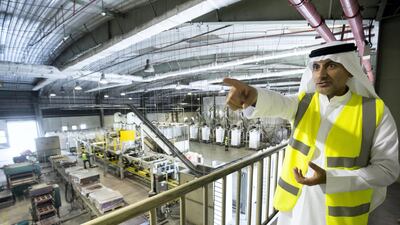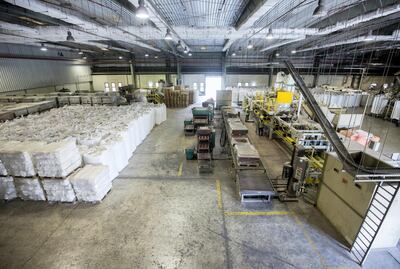Robots that use artificial intelligence to sort rubbish, a fleet of Tesla waste collection lorries and a headquarters in one of the world's smartest buildings – Sharjah seems to have everything it needs to hit its zero waste target for 2021.
The one thing that’s missing? A population that sorts its rubbish.
After decade of public awareness campaigns, including four years of door-to-door education, Sharjah residents still won't separate paper from plastic.
“Unfortunately, even with all the investment we put into [raising] awareness, we still have a long way to go,” said Khaled Al Huraimel, chief executive of Sharjah waste management company Bee’ah.
“It’s a continuous process and that’s why we’re investing in infrastructure, but we hope with time we’ll see more active participation from the community.”
Mr Al Huraimel stood inside the warehouse known as the tipping room, where 1,500 tonnes of solid waste from Sharjah city are processed every day. That is a fraction of the action on the four square kilometre site, where more than 8,000 tonnes of waste arrive every day.
In one yard, construction waste is crushed. In another barrels of chemical waste are treated.
There is a scrapyard with a shredder that splinters cars in 60 seconds and a warehouse where tyres are frozen and pulverised into rubber tiles or exported as raw material.
Sharjah's waste management wasn't always this good. Just more than a decade ago, waste disposal consisted of a dump in the desert, a small mountain of construction debris, household rubbish and tyres that grew higher by the day.
Things turned around in 2007 when the government founded Bee’ah, a public-private environmental company. Its waste recovery facility, the largest in the region, opened in 2009.
A decade on, Be'eah's landfill diversion rate – the proportion of waste that does not end up in landfills – of 76 per cent is the highest in the Middle East.
This is no small feat: the UAE is a prolific producer of rubbish, with each person accounting for 2.5 kilograms of municipal waste a day. The lion's share is attributed to the construction and industrial sectors.
Household rubbish ends up on a 20-metre conveyor belt where it is processed by five mechanical sorters.
Bee’ah plans to pioneer AI sorting robots in the near future, which will scan and separate waste more quickly and accurately.
But recovery would be far higher if people would sort their waste at home first.
“Definitely in terms of reduction of waste, we still have a problem that a lot of waste doesn’t come to us clean,” said Mr Al Huraimel. “If the waste came to us clean, it wouldn’t need all these resources.”
The Emirates presents a unique challenge as 89 per cent of the country are expatriates from diverse backgrounds, without permanent residency.
There are also no punitive measures if people simply decide not to sort their rubbish.
“The community is very supportive but it’s continuous awareness that we have to keep doing because the demographics of the UAE are very unique,” said Mr Huraimel.
“We actually visited every single villa. It took us four years.”
Now, the emphasis is on using materials recovered through local processing instead of shipping recycling and waste by-products overseas.
China processed half the world's waste for 25 years but banned the import of most plastics and other waste materials in January last year.
Other Asia countries have considered doing the same.
In a country such as the UAE where natural resources such as wood are limited, local processing also makes economic sense. Currently, paper is reprocessed but most recycling is still shipped overseas.
In the future, whatever can be recovered at Bee’ah will be incinerated at a waste-to-energy plant that burns up to 37.5 tonnes of rubbish an hour and can produce 30 megawatts of energy a year, enough to power 300 homes.
This will feed the Sharjah Electricity and Water Authority grid when it opens in 2021.
Bee'ah ordered a fleet of 50 Tesla electric lorries for long-haul waste collection, to run alongside its fleet of 1,200 collection vehicles.
Next year, Bee'ah will move into new dune-shaped headquarters, designed by the late Zaha Hadid, powered by renewable energy and fitted with the latest AI technology.
The building will record minutes at meetings, guide guests to conference halls and optimise ambient settings in each room according to the personal preferences of employees.
Company%20profile
%3Cp%3EName%3A%20Tabby%3Cbr%3EFounded%3A%20August%202019%3B%20platform%20went%20live%20in%20February%202020%3Cbr%3EFounder%2FCEO%3A%20Hosam%20Arab%2C%20co-founder%3A%20Daniil%20Barkalov%3Cbr%3EBased%3A%20Dubai%2C%20UAE%3Cbr%3ESector%3A%20Payments%3Cbr%3ESize%3A%2040-50%20employees%3Cbr%3EStage%3A%20Series%20A%3Cbr%3EInvestors%3A%20Arbor%20Ventures%2C%20Mubadala%20Capital%2C%20Wamda%20Capital%2C%20STV%2C%20Raed%20Ventures%2C%20Global%20Founders%20Capital%2C%20JIMCO%2C%20Global%20Ventures%2C%20Venture%20Souq%2C%20Outliers%20VC%2C%20MSA%20Capital%2C%20HOF%20and%20AB%20Accelerator.%3Cbr%3E%3C%2Fp%3E%0A
Opening Rugby Championship fixtures: Games can be watched on OSN Sports
Saturday: Australia v New Zealand, Sydney, 1pm (UAE)
Sunday: South Africa v Argentina, Port Elizabeth, 11pm (UAE)
The specs
Engine: 2.7-litre 4-cylinder Turbomax
Power: 310hp
Torque: 583Nm
Transmission: 8-speed automatic
Price: From Dh192,500
On sale: Now
DUNE%3A%20PART%20TWO
%3Cp%3E%3Cstrong%3EDirector%3A%3C%2Fstrong%3E%20Denis%20Villeneuve%3C%2Fp%3E%0A%3Cp%3E%3Cstrong%3EStarring%3A%3C%2Fstrong%3E%20Timothee%20Chamalet%2C%20Zendaya%2C%20Austin%20Butler%3C%2Fp%3E%0A%3Cp%3E%3Cstrong%3ERating%3A%3C%2Fstrong%3E%205%2F5%3C%2Fp%3E%0A
How much sugar is in chocolate Easter eggs?
- The 169g Crunchie egg has 15.9g of sugar per 25g serving, working out at around 107g of sugar per egg
- The 190g Maltesers Teasers egg contains 58g of sugar per 100g for the egg and 19.6g of sugar in each of the two Teasers bars that come with it
- The 188g Smarties egg has 113g of sugar per egg and 22.8g in the tube of Smarties it contains
- The Milky Bar white chocolate Egg Hunt Pack contains eight eggs at 7.7g of sugar per egg
- The Cadbury Creme Egg contains 26g of sugar per 40g egg
Racecard
%3Cp%3E8.30pm%3A%20Wathba%20Stallions%20Cup%20%E2%80%93%20Maiden%20(PA)%20Dh70%2C000%20(Turf)%201%2C200m%3Cbr%3E9pm%3A%20Yas%20Island%20%E2%80%93%20Handicap%20(PA)%20Dh80%2C000%20(T)%201%2C400m%3Cbr%3E9.30pm%3A%20Saadiyat%20Island%20%E2%80%93%20Handicap%20(PA)%20Dh80%2C000%20(T)%201%2C600m%3Cbr%3E10pm%3A%20Reem%20Island%20%E2%80%93%20Handicap%20(PA)%20Dh80%2C000%20(T)%202%2C200m%3Cbr%3E10.30pm%3A%20Arabian%20Triple%20Crown%20Round%203%20%E2%80%93%20Group%203%20(PA)%20Dh300%2C000%20(T)%202%2C400m%3Cbr%3E11pm%3A%20Al%20Maryah%20Island%20%E2%80%93%20Handicap%20(TB)%20Dh80%2C000%20(T)%201%2C600m%3C%2Fp%3E%0A
EA Sports FC 26
Publisher: EA Sports
Consoles: PC, PlayStation 4/5, Xbox Series X/S
Rating: 3/5
The Settlers
Director: Louis Theroux
Starring: Daniella Weiss, Ari Abramowitz
Rating: 5/5
UAE v Zimbabwe A
Results
Match 1 – UAE won by 4 wickets
Match 2 – UAE won by 5 wickets
Match 3 – UAE won by 25 runs
Match 4 – UAE won by 77 runs
Fixture
Match 5, Saturday, 9.30am start, ICC Academy, Dubai
SPECS
%3Cp%3E%3Cstrong%3EEngine%3A%3C%2Fstrong%3E%201.5-litre%204-cylinder%3Cbr%3E%3Cstrong%3EPower%3A%3C%2Fstrong%3E%20101hp%3Cbr%3E%3Cstrong%3ETorque%3A%3C%2Fstrong%3E%20135Nm%3Cbr%3E%3Cstrong%3ETransmission%3C%2Fstrong%3E%3A%20Six-speed%20auto%3Cbr%3E%3Cstrong%3EPrice%3A%3C%2Fstrong%3E%20From%20Dh79%2C900%3Cbr%3E%3Cstrong%3EOn%20sale%3A%3C%2Fstrong%3E%20Now%3C%2Fp%3E%0A
Company%20Profile
%3Cp%3E%3Cstrong%3EName%3A%20%3C%2Fstrong%3EDirect%20Debit%20System%3Cbr%3E%3Cstrong%3EStarted%3A%3C%2Fstrong%3E%20Sept%202017%3Cbr%3E%3Cstrong%3EBased%3A%3C%2Fstrong%3E%20UAE%20with%20a%20subsidiary%20in%20the%20UK%3Cbr%3E%3Cstrong%3EIndustry%3A%3C%2Fstrong%3E%20FinTech%3Cbr%3E%3Cstrong%3EFunding%3A%3C%2Fstrong%3E%20Undisclosed%3Cbr%3E%3Cstrong%3EInvestors%3A%3C%2Fstrong%3E%20Elaine%20Jones%3Cbr%3E%3Cstrong%3ENumber%20of%20employees%3A%3C%2Fstrong%3E%208%3Cbr%3E%3C%2Fp%3E%0A
It Was Just an Accident
Director: Jafar Panahi
Stars: Vahid Mobasseri, Mariam Afshari, Ebrahim Azizi, Hadis Pakbaten, Majid Panahi, Mohamad Ali Elyasmehr
Rating: 4/5
The five pillars of Islam
1. Fasting
2. Prayer
3. Hajj
4. Shahada
5. Zakat
On racial profiling at airports
UK's plans to cut net migration
Under the UK government’s proposals, migrants will have to spend 10 years in the UK before being able to apply for citizenship.
Skilled worker visas will require a university degree, and there will be tighter restrictions on recruitment for jobs with skills shortages.
But what are described as "high-contributing" individuals such as doctors and nurses could be fast-tracked through the system.
Language requirements will be increased for all immigration routes to ensure a higher level of English.
Rules will also be laid out for adult dependants, meaning they will have to demonstrate a basic understanding of the language.
The plans also call for stricter tests for colleges and universities offering places to foreign students and a reduction in the time graduates can remain in the UK after their studies from two years to 18 months.
The Orwell Prize for Political Writing
Twelve books were longlisted for The Orwell Prize for Political Writing. The non-fiction works cover various themes from education, gender bias, and the environment to surveillance and political power. Some of the books that made it to the non-fiction longlist include:
- Appeasing Hitler: Chamberlain, Churchill and the Road to War by Tim Bouverie
- Some Kids I Taught and What They Taught Me by Kate Clanchy
- Invisible Women: Exposing Data Bias in a World Designed for Men by Caroline Criado Perez
- Follow Me, Akhi: The Online World of British Muslims by Hussein Kesvani
- Guest House for Young Widows: Among the Women of ISIS by Azadeh Moaveni
The specs
Engine: 6.2-litre supercharged V8
Power: 712hp at 6,100rpm
Torque: 881Nm at 4,800rpm
Transmission: 8-speed auto
Fuel consumption: 19.6 l/100km
Price: Dh380,000
On sale: now
What is graphene?
Graphene is extracted from graphite and is made up of pure carbon.
It is 200 times more resistant than steel and five times lighter than aluminum.
It conducts electricity better than any other material at room temperature.
It is thought that graphene could boost the useful life of batteries by 10 per cent.
Graphene can also detect cancer cells in the early stages of the disease.
The material was first discovered when Andre Geim and Konstantin Novoselov were 'playing' with graphite at the University of Manchester in 2004.
KILLING OF QASSEM SULEIMANI

